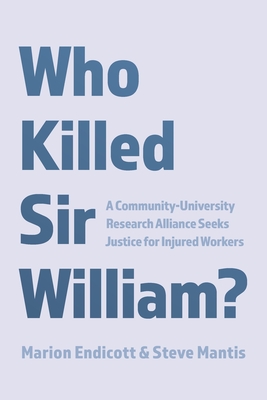Who Killed Sir William?: A Community-University Research Alliance Seeks Justice for Injured Workers

Who Killed Sir William?: A Community-University Research Alliance Seeks Justice for Injured Workers
What happened? How can we find out the experiences and needs of injured and disabled workers, and how can the necessary changes be put into action?
To answer such questions, the Research Action Alliance on the Consequences of Work Injury (RAACWI), a community-based research initiative that brought advocates, injured workers, and academics together, was formed. Who Killed Sir William? provides an engaging look at RAACWI's eight years of groundbreaking work and what a successful community-academia partnership looks like to inform and inspire fellow academics, advocates, and community. Its discussion includes (and goes beyond):
- Developing a trusting, productive, community-advocate-academic
relationship
- Successes such as the production of over twenty research publications, effective running of meetings, and a speakers school for injured workers
- The use of diverse teaching methods, including skits and theatre pieces
- Some of the challenges RAACWI faced (and how they overcame them)
Who Killed Sir William? authors Marion Endicott and Steve Mantis not only offer insight on the systemic assailants, but also lay out a process of addressing them.
PRP: 142.54 Lei
Acesta este Prețul Recomandat de Producător. Prețul de vânzare al produsului este afișat mai jos.
128.29Lei
128.29Lei
142.54 LeiLivrare in 2-4 saptamani
Descrierea produsului
What happened? How can we find out the experiences and needs of injured and disabled workers, and how can the necessary changes be put into action?
To answer such questions, the Research Action Alliance on the Consequences of Work Injury (RAACWI), a community-based research initiative that brought advocates, injured workers, and academics together, was formed. Who Killed Sir William? provides an engaging look at RAACWI's eight years of groundbreaking work and what a successful community-academia partnership looks like to inform and inspire fellow academics, advocates, and community. Its discussion includes (and goes beyond):
- Developing a trusting, productive, community-advocate-academic
relationship
- Successes such as the production of over twenty research publications, effective running of meetings, and a speakers school for injured workers
- The use of diverse teaching methods, including skits and theatre pieces
- Some of the challenges RAACWI faced (and how they overcame them)
Who Killed Sir William? authors Marion Endicott and Steve Mantis not only offer insight on the systemic assailants, but also lay out a process of addressing them.
Detaliile produsului










